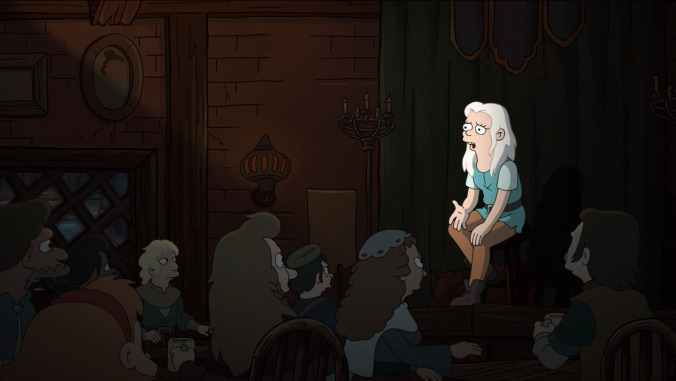Bean embraces the written word on a thoughtful, creative Disenchantment

Considering there are only three episodes left in the season, “In Her Own Write” predictably returns to the Dagmar well. The specter of her mother haunts Bean’s dreams and plagues Zøg’s mind to the point where he’s removing all the tulips from the kingdom. A normally negligent parent can permanently destabilize a family, but an evil mother who turned an entire kingdom to stone, tried to kill her husband and sacrifice her daughter to fulfill a still-vague prophecy, and mask her intentions with love can…well, destroy a family entirely. Bean and Zøg may not be the cuddliest father-daughter duo around, but they’re doing pretty well given the circumstances.
Still, Bean’s nightmares aren’t going away and it’s clear she needs to actually address her latent mother issues instead of suppressing them at the bar. So Bean switches from booze to coffee and tries a hand at writing after a serendipitous visit to The Jittery, Dreamland’s local coffee shop. At first, it goes about as well as you’d expect: aborted first drafts, crumpled-up paper, Luci constantly bugging her. It’s only after Bean abandons prose for playwriting when she finally cracks open her talent. Her work impresses the groundlings in the kingdom (Stan the executioner calls it “a heartbreaking work of average-to-moderate genius”), but she can’t get her foot in the door at the Dreamland Playhouse because she’s a woman. However, when Merkimer the pig knocks on the door and presents the play as his own, they let him waltz right through the door, even though he’s covered in his own manure.
As soon as Odval gets wind of the play, he tells Zøg that the peasants plan to mock the kingdom to distract from their worthless lives. (“That’s what religion is for!” the Arch Druidess exclaims.) He convinces Zøg to attend and determine whether or not the Dreamland Playhouse players are guilty of treason. As soon as Merkimer trots on stage in royal garb, the audience bursts out laughing at the porcine implication, but Zøg, a King who prefers the simple pleasures of the circus to the theater, doesn’t quite pick up on the joke. It’s only near the end of the play that he finally gets it and demands everyone’s heads.
After he storms out of the playhouse, he notices that Bean has a captivated audience next door at The Jittery’s amateur night. She talks about how she regrets rejecting Oona and that the best mothering she ever received was from “a fat guy with a red mustache.” Disenchantment’s heart lies with the father-daughter relationship at its core, and though the series often strays from that path, it jolts to life when it returns. Zøg’s tempestuous disposition belies his soft heart and seeing Bean determined to fight her nightmares instead of letting them control her soothes his rage. Bean never needed her play to express her. She just needed to put her feelings into words. For people like her and Zøg, direct speech gets the job done a lot better than art.
 Keep scrolling for more great stories.
Keep scrolling for more great stories.
